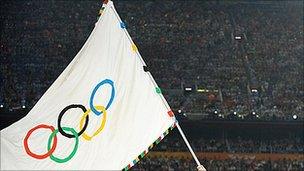Ideas sought on promoting 'Olympic peace' in 2012
- Published

The Olympics should be a force for peace and solidarity between nations, its organisers say
Ministers are to consult on how the 2012 Olympics can be used as a catalyst to promote international peace.
They want to see how the ancient concept of an "Olympic truce", where signatories refrained from conflict during the Games, can be applied now.
Lord Mawhinney suggested there should be a direct link between peaceful conduct and taking part in the Games.
But Lord Jopling said the Games itself was an invitation "to bombs and bloodshed" in London.
Devised in Ancient Greece, the truce was designed to stop conflict in the immediate run-up to the tournament and its aftermath in order to allow competitors safe passage to the tournament.
'Violated'
The concept was revived by the International Olympic Committee for the Barcelona Games in 1992 and backed by the United Nations in a resolution a year later.
However, it has not prevented conflict from occurring during a Games, the Russian-Georgian war of 2008 coinciding with the Beijing tournament.
In a short debate on the issue in the Lords, Conservative peer Lord Bates asked what preparations had been made to "implement" the truce for 2012 Olympic and Paralympic Games.
"The truce has been violated on virtually every single occasion," he told peers. "What steps can the government take to make sure we do things differently?"
For the government, Lady Garden said the matter should not be "overlooked" and the government would "welcome proposals and ideas" about securing the widest possible legacy for the 2012 Games.
While the truce symbolised the Olympic ideals of humanitarian solidarity, dialogue and reconciliation, she said it was up to the international community to translate that vision into reality.
"It is quite difficult to look back for real examples of previous countries who have declared their support for the Olympic Truce but have found it quite difficult to have particular outcomes which demonstrate that," she told the Lords.
'Expensive circus'
Several peers said concrete steps were needed not, as former Chief of the Defence Staff Lord Boyce put it, "the fine-sounding words" of the last 100 years - a period which has seen numerous boycotts of the Games and terrorist attacks on competitors.
Former Conservative cabinet minister and Football League chairman Lord Mawhinney urged ministers to consider "linking the observance of a Olympic truce by a country with its participation in the following Olympics".
But fellow Tory Lord Jopling said he was more concerned about protecting Londoners during the Games amid reports that the budget for Olympic security was under pressure.
"Whether we have a truce or not, this extremely expensive two-week circus in London is going to be an invitation for bombs, bullets, bloodshed, blackmail and boycott," he said.